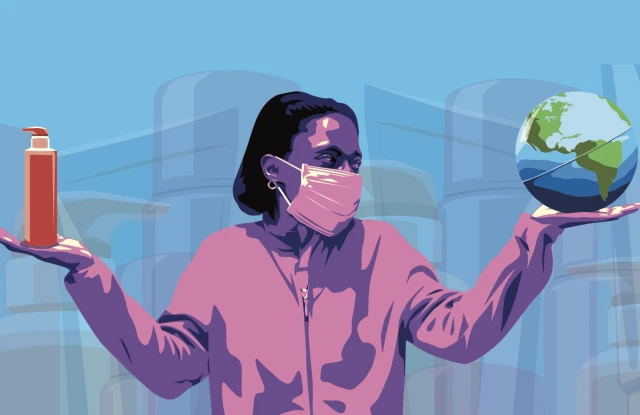While the effects of Covid-19 on the planet and people may vary widely, it is clear that it has and continues to leave a significant impact. The almost total shut down of many industries has dramatically decreased air pollution and fostered a resurgence in nature. Images of wildlife reclaiming popular tourist sites and major cities prove that change is possible. Yet, as we enter a Post-Covid world it remains unclear what this new normal will look like. For many around the world Covid-19 has decimated their livelihoods. But this is a time for rebuilding which offers an opportunity for greater awareness of climate change and sustainability and their effects on inequality.
The pandemic has highlighted the negative impacts of food insecurity, environmental degradation, and unequal access to resources for vulnerable communities around the world. While all of these existed before Covid-19, current events have only exacerbated the problems faced by many. Production in many sectors has halted affecting access to essentials such as food and water. Now is the time to target these inequalities. From revamping global food systems to investing more in sustainable agriculture, organizations and communities should work to support environmentally friendly systems that better the planet and at-risk communities around them. Much of this can be done through small changes to daily life.

Additionally, these changes have already made an impact as seen through physical distancing. Businesses have inadvertently altered their practices towards sustainability. The recent increase in employees working from home has drastically cut carbon emissions from commuting with many fewer cars on the road. While this may be temporary, these adjusted business practices can remain. This would permanently alter the amount of harmful emissions put into the environment. The necessary changes due to Covid-19 has shed light on the feasibility of more sustainable living. Everyday activities are possible with more environmental awareness.
Taking this a step further, people can go beyond Covid induced sustainable practices such as water conservation and recycling programs now that environmental changes have proved easy and beneficial. Businesses can invest in more robust recycling programs especially for electronics and office supplies. Similarly, efficient faucets and toilets can significantly decrease water consumption. Moreover, implementation of sustainable everyday practices does not require any significant monetary investment but remains crucial to a climate conscious lifestyle. Allowing employees to work from home when it is feasible and creating policies that require electronics be powered down and lights turned off at the end of the day can go a long way to sustaining the planet.
As we reimagine how society should function, future mutual aid and policymaking must support sustainability. Without actions directly focused on climate sensitive recovery and rebuilding, we risk returning to a society fully reliant on carbon emissions rather than investing in infrastructure to support clean energy. Furthermore, such infrastructure must be non-discriminatory. With Covid-19 highlighting great inequalities in society, accessibility to sustainable systems is essential. Because environmental degradation is felt most by underserved communities, actions aimed at eco-friendly living will have the greatest impact. The adoption of sustainable practices on both a global and local scale will make communities more resilient to environmental shocks.
Moreover, with the global economy recovering from economic shut down, this provides an opportunity to invest in clean energy and sustainable programs. Because we are just beginning to enter a Post-Covid society, a renewed focus on environmental consciousness and sustainable living will hopefully become the norm. These practices in the economic sphere are feasible through aligning the long-term wellbeing of businesses and the planet. Transitioning some means of production towards sustainability can place environmental improvement in the same sphere as economic recovery.

While the Covid-19 pandemic has caused disastrous effects for many across the globe, it has also opened our eyes to both inequality and climate conscious living. With a lack of sufficient access to resources and widespread industry shut down, the effects of environmental degradation are significantly felt. Yet, globally a sense of community and need to protect the planet has arisen leading to what can hopefully provide a way forward. Investing in sustainable business practices and in everyday life can go a long way to mitigating our own carbon footprints. Everyone has a responsibility to incorporate even small lifestyle changes into their daily lives and places of work. Additionally, because rural and low-income communities are disproportionately affected by climate change, conservation works in solidarity with people all around the globe. Despite the horrific events of the past few months, we can take away the knowledge that sustainability is not only possible but more attainable than we thought. With this knowledge, there’s no excuse not to take action.
Sources:
https://blogs.ei.columbia.edu/2020/04/23/covid-19-lessons-sustainability/
https://www.weforum.org/agenda/2020/05/the-covid-19-reset-sustainability/
https://www.iisd.org/library/coronavirus-shaping-sustainable-development
https://www.un.org/sustainabledevelopment/blog/2020/04/ensuring-food-security-covid-19/

Leave a Reply
You must be logged in to post a comment.